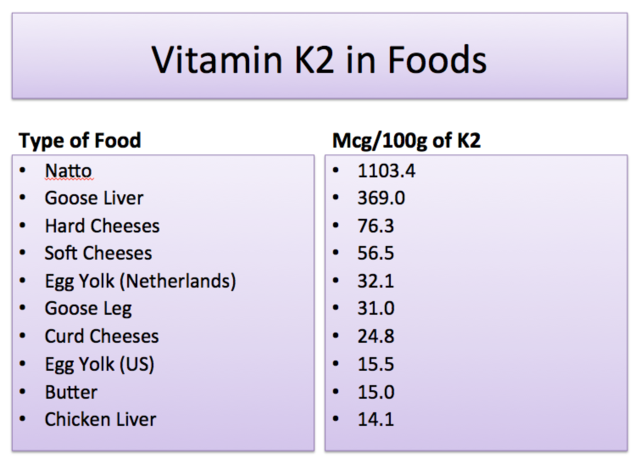by Tom Malterre | 24 comments
Cardiovascular (heart and blood vessel) disease is the most common cause of death in the US with over 801,000 people dying every year. Over 1,370 people die every day because plaques containing calcium build up in their blood vessels. This restricts the flow of life-giving blood to their hearts and their brains and may lead to a heart attack or stroke.
But how does the calcium get there? Is it from the calcium and vitamin D supplements you may be taking? It could be. Is there a missing nutrient that can prevent calcium deposits in the arteries and thus arterial plaque build-up? Yes there is--vitamin K2.
In 2010, scientists examined 12,000 people over the age of 40 and found that, by taking 1,000mg of calcium a day, they had a 30% increase incidence of heart attacks.
Another 2011 research trial of 36,282 post menopausal women compared those taking 1,000mg of calcium and 400IU of vitamin D per day with those taking a placebo and found a 21% increased risk of a heart attack and a 20% increased risk of stroke.
A third study in 2012 of 23,980 subjects found a 239% increased risk of a heart attack with those taking calcium supplements. Interestingly, there was no increase in people that got their calcium from diet alone.
And lastly, a 2013 paper looked at 61,433 women that were followed for 19 years confirmed these findings. It showed that women who had a high dietary intake of calcium (>1400mg per day) and took calcium supplements were 2.57 times more like to die from all causes including cardiovascular disease but not from stroke.
Vitamin K2 can prevent heart disease and stroke.
Here is how it works. Vitamin D is a hormone. It changes the gene expression in your intestinal cells and allows them to bind more calcium and pull it in to the body. When you have low levels of vitamin D, you get around 10-15% absorption of calcium. When you have higher levels of vitamin D, you get between 30-40% absorption of calcium. If you are taking 1000-1500mg of calcium and 3,000-5,000 IU of vitamin D every day, you are getting a lot of calcium circulating in your body. This is where K2 comes in. K2 is used by the body to make a series of proteins that will protect the body from excess calcium. Two such proteins are called osteocalcin and matrix GLA protein or MGP. Osteocalcin, after being primed by vitamin K2, will bind to calcium and put it in the bones. Matrix GLA Protein (MGP), after being primed by K2, will sweep through the soft tissues of the body (think blood vessels) and clean up any calcium that deposited itself there. In essence, these two proteins keep calcium out of the vessels and put it in the bones.
When we do not have enough vitamin K2 around, calcium can accumulate in the vessels that lead to the heart and the brain, thus increasing the risk of having a heart attack or stroke.
On the opposite end of the spectrum, human studies are demonstrating the ability of increased levels of vitamin K2 to decrease arterial calcification and cardiovascular deaths.
In 2004, 4,807 people were evaluated for vitamin K intake. People eating the foods with the highest K2 had up to a 52% decrease in arterial calcification. They also had up to a 57% decrease in death from heart disease. The foods most associated with the decreased rates were meats, eggs, sauerkraut, fish, cheese, and other dairy products. Note: pastured/grass fed dairy product have higher levels.
Two scientific trials confirmed these findings with one showing a 20% decrease in coronary artery calcification with higher vitamin K2 intake and the second approximated a 9% decrease in coronary heart disease for every 10mcg of vitamin K2 that was ingested per day.
Supplementation with K2 appears to be effective as well. When 180mcg of MK7 was taken every day for 3 years by healthy postmenopausal women, it improved arterial stiffness.
There are some upcoming trials where researchers are supplementing vitamin K2 in the form of MK7 and measuring multiple markers of cardiovascular disease. The authors of the VitaK-CAC trial made this optimistic statement. “We hypothesize that treatment with MK7 will slow down or arrest the progression of CAC and that this trial may lead to a treatment option for vascular calcification and subsequent CVD. “ Results from this trial will not be complete until October of 2017 and will likely be published many months after that. Until then, there is a compelling argument to look at vitamin K2 when there is a concern for cardiovascular disease.
How do you know if this is an issue for you?
Look for these signs of possible vitamin K2 deficiency:
- Suffer from a digestive disorder that can lead to fat soluble vitamin insufficiencies (Small Intestinal Bacterial Overgrowth or SIBO, Irritable Bowel Syndrome, Inflammatory Bowel Disease, Celiac Disease, Cystic Fibrosis)
- Osteoporosis or osteopenia
- Tooth decay
- Elevated blood pressure
- Calcification of the aorta, coronary arteries, or carotid artery
- Calcification of the muscles, joints (osteoarthritis), tendons (calcific tendonitis), kidneys, or brain
- Have had a previous stroke
- Have had a previous heart attack
- Diet low in liver, natto (fermented soybean preparation), pastured dairy (especially cheeses), and egg yolks
- Taking a high dose vitamin D supplements >3000IU per day
- Have Chronic Kidney Disease and/or are on dialysis
Testing for Deficiency of K2
You can test a marker of vitamin K2 deficiency call undercarboxylated osteocalcin. This is a blood test offered by Genova Diagnostics that is called the Vitamin K Assay and it runs around $200 dollars. If you have high levels of undercarboxylated osteocalcin, it implies that you may have an issue with vitamin K2 insufficiency. Call your local Functional Medicine practitioner or Genova Diagnostics (1-800-522-4762) for more details.
If you have signs of deficiency or a lab test indicating a need for vitamin K2, you will likely benefit from increasing your intake of vitamin K2 containing foods and supplements. If you are taking the blood-thinning medication called Warfarin or Coumadin, you must consult with your primary care physician before taking any vitamin K or increasing vitamin K-rich foods in your diet.
Case Study:
A vibrant 70 year old women interested in Functional Medicine came in to see me recently. At the age of 49, she received the diagnosis of aortic calcification and recurring calcification of the tendons. When she turned 53, her medical team added osteoarthritis to the mix and at 54 they topped it off with a decrease in bone density. Like a good patient, she was diligently taking her 1000mg of calcium and 4,000IU of vitamin D every day to increase her bone density. Based on her health history, this was likely a dangerous thing to be doing.
At the same time vitamin D upregulates proteins to pull more calcium in, it also upregulates the protein (osteocalcin) to put that calcium in the bones. An increase level of osteocalcin means there is an increase need for vitamin K. Osteocalcin uses up vitamin K to become active. If a person is already deficient in K, this could make things worse.
The calcification of the aorta, tendons, joints (osteoarthritis), and lack of bone density clued me in to the fact that she was likely difficient in K so she ran a Vitamin K assay to check. Sure enough...levels of undercarboxylate osteocalcin, and indicator of low K2 levels...were significantly elevated. This implied that her K2 levels were quite low and that both the high levels of vitamin D and calcium she was taking were increasing her circulating calcium levels. Without the K2 to put the calcium in the bones and keep it out of her tendons and vessels, her supplementation was likely contributing to her health issues. I recommend always considering K2 levels whenever taking supplemental vitamin D and calcium. If you want to dive deeper in to case studies, biochemistry, and functional medicine protocols, see our Progressive Practitioner Coaching Program. Use Promo Code MAKECHANGE for 50% off until June 3rd.
Supplementation
There are two types of vitamin K2 that most people refer to when they talk about supplementation: MK4 and MK7.
MK4 is has a very short half-life (1-2 hours) so large doses at frequent intervals are required for optimal results. Numerous trials have shown benefit with bone health when people supplement 15mg of MK4 three times a day.
MK7 has been found in the body up to 72 hours after dosing and appears to be even more efficient at lowering vitamin K dependent proteins than MK4. Therefore, smaller dosing is needed (100-400mcg). The cost of supplementation is usually considerably lower with MK7.
Vitamin K supplementation is considered safe, and there are no toxic upper limits for either vitamin K1 and K2.
It appears that each form of vitamin K is used differently in various tissues and organs of the body so a combination of various vitamin K forms from supplements and the diet may be ideal. Like all supplements, I recommend choosing a brand that uses the highest quality raw materials, has tested purity, and is free of contaminants and rancid carrier oils. My clients have found success using the Thorne Research 3-K Complete product along with the Thorne Vitamin D/K2 Drops. This combination assures significant levels of all forms of vitamin K, and vitamin D as well. You can view this YouTube video for my recommendations.
Foods Rich in Vitamin K2

References
-
Circulation. 2017;135:e146-e603
-
BMJ 2010;341:c3691
-
BMJ 2011;342:d2040
-
Heart 2012;98:920e925
-
BMJ 2013;346:f228
-
N Engl J Med. 2007;357(3):266–281.
-
Zhang et al. Journal of Biomedical Science (2015) 22:75
-
Adv. Nutr. 3: 166–173, 2012.
-
J Hum Nutr Food Sci 4(1): 1077 (2016)
-
Blood. 2004;104: 3231-3232
-
Asia Pac J Clin Nutr 2013;22 (3):492-496
-
J. Nutr. 2004 Nov; 134 (11): 3100-3105
-
Atherosclerosis. 2009 Apr;203(2):489-93.
-
Nutr Metab Cardiovasc Dis. 2009 Sep;19(7):504-10.
-
Thromb Haemost. 2015 May;113(5):1135-44.
-
Nutrients 2015, 7, 8905–8915
-
Pizzorno, Lara Longevity Medicine Review, Vitamin D and Vitamin K Team Up to Lower CVD Risk: Part II
-
Nutrients. 2014 May; 6(5): 1971–1980.
-
IMAGE of K2 Food Sources adapted from- https://www.westonaprice.org/health-topics/abcs-of-nutrition/on-the-trail-of-the-elusive-x-factor-a-sixty-two-year-old-mystery-finally-solved/#foods

Stay up to date with the current science and recipes that can help make your family healthy.

Comments
Thank-you!
by Amy F;) on Wed, 05/31/2017 - 7:17am
Vitamin K2
by Maureen Pecaric on Wed, 05/31/2017 - 10:19am
Vitamin K2- More than once a day?
by Tom Malterre on Fri, 06/02/2017 - 12:06am
vita K supplementation
by Paul T. on Thu, 06/01/2017 - 1:16pm
Re: "vita K supplementation"
by Tom Malterre on Fri, 06/02/2017 - 12:04am
Taking K2 w blood thinners
by Nikki on Fri, 06/02/2017 - 11:53am
Re: Taking K2 with Blood Thinners (Warfarin)
by Tom Malterre on Wed, 06/07/2017 - 3:45pm
Vitamin K2 and warfarin
by Roberta on Mon, 04/09/2018 - 6:04am
k2 response
by margaret on Fri, 04/24/2020 - 4:42am
K2 and aspirin
by brian on Mon, 05/11/2020 - 8:53am
Natto is so high in K
by Marti M. on Sat, 06/03/2017 - 9:49pm
Great info
by Jurgen on Tue, 06/06/2017 - 8:34pm
Are bone spurs helped by K2?
by Cathy Joly on Fri, 06/09/2017 - 2:08pm
Calcium
by Maureen on Wed, 06/21/2017 - 7:09pm
K2 taken with Statin Drugs
by Shelle on Wed, 10/18/2017 - 6:11am
Vitamin K-2, MK7 and Warfarin
by Janice J Healey on Sat, 08/25/2018 - 4:52pm
Natto
by Dwight Jessup on Mon, 11/12/2018 - 6:20pm
Stents and aspirin
by Sabrina on Mon, 04/08/2019 - 1:14pm
Insomnia
by Michelle Jacobs on Mon, 05/20/2019 - 4:45pm
Eliquis
by Gearold Batson on Sun, 03/08/2020 - 1:10am
Osteophytes on finger joints
by Alexandra on Sun, 04/12/2020 - 2:20pm
Vitamine k2mk7
by Hoek on Sun, 12/27/2020 - 11:48am
Vitamin K2
by Lilly Day on Fri, 04/23/2021 - 4:17pm
VitaminD/k2
by Craig on Fri, 11/26/2021 - 6:57am
Add new comment